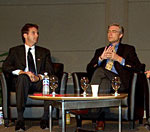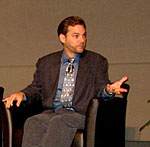By Laura McCallum
Minnesota Public Radio
September 19, 2002
Candidates for governor offered different approaches as they debated business and high-tech issues on Thursday before an audience of business executives. Republican Tim Pawlenty, Independence Party candidate Tim Penny and the Green Party's Ken Pentel discussed Minnesota's job climate at a debate sponsored by the Minnesota High Tech Association.
| |
|
|
|
||
Pawlenty, Penny and Pentel debated at the world headquarters of ADC, a broadband communications company based in Eden Prairie. DFLer Roger Moe joined them briefly by phone, but cited the flood relief special session as reason for his absence. Moe says his approach to job growth involves an educated workforce.
"You do have to talk about tax policy and regulatory issues and available capital, but if you forget and don't talk about our education systems or quality of life, I think we're missing some things. So I have constantly focused on making sure that our educational systems are the best they can be," Moe said.
Moe, the longtime Senate majority leader, says he's supported the University of Minnesota's efforts to focus on technology.
The other three major party candidates spent the next hour on issues ranging from taxing Internet sales -- which all three oppose -- to telecommunications reform. Pawlenty and Penny support regulatory reform, while Pentel says there should be regulation to protect consumers.
The three had different ideas about ways to spur the state's technology sector. Pawlenty, the House majority leader who works for a high-tech company called Whizmo, says he's the only candidate who truly understands the industry. He says there are three key ingredients to a successful high-tech economy.
"They are people, they are ideas and they are money. And you need a critical mass and infusion of those three things coming together in a way that creates an entrepreneurial culture and climate, and those ingredients need to brew in a way that foster economic development, job growth and company expansion," he said.
| |
|
|
|
||
Pawlenty wants to lower tax rates for the business sector, and is the only candidate who has pledged not to raise taxes to balance the budget if he's elected.
Penny, a former DFL congressman who switched to the Independence Party, says he won't raise income taxes, although he is open to other tax increases. He says the state should focus on job growth in three areas of the technology sector.
"Medical technology, bio-technology, information technology. We know that if we put more of our resources and our energy and our attention behind these three key areas, and these are the areas where most of the 5,000-plus firms in Minnesota are associated today, that we can grow these areas bigger and better on into the future," he said.
Penny says his independence from the two traditional major parties means he can bring business and government and academic institutions to the table to solve problems.
The Green Party's Pentel was the least well-versed on the high-tech economy, and admitted he needed more information on some issues. He says the state should focus on technology that helps people live healthier lives.
Pentel, who hasn't owned a car in 20 years, talked about a low-tech solution to commuting hassles.
"My main means of transportation has been a bicycle. Simple, but probably one of the best technologies ever invented. And it keeps the body fit, keeps the air clean, and it's a model of what I'm talking about when I talk about appropriate technologies," he said.
Pentel also touted a single-payer health care system, as a way for the state to help businesses struggling to pay health insurance costs for employees.
At least nine other debates are scheduled in the final seven weeks before the election.
More from MPR

